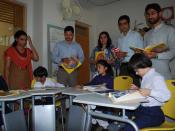Developing Inclusive Practice within MathematicsInclusion is essentially about meeting the needs of all pupils, whether they are the 'gifted and talented', the average child, or the child with any 'Special Educational Needs' (SEN). The National Curriculum definition is 'providing effective learning opportunities for all pupils' - this involves removing/minimising barriers to learning and achievement. Promoting inclusion should broaden academic and social opportunities for all pupils.
Regardless to the ability of each individual pupil, inclusion will prevent children generating a feeling of inferiority which would then lead to a lack of motivation, self-confidence and most importantly learning. Inclusion allows all pupils to work and learn as independently as possible as well as developing their communication and interaction skills with their peers.
Allowing inclusive practice for all SEN pupils generates an ever growing argument; defending its successful attributes as well as its defensive disadvantages. The inclusion of students with special educational needs in mainstream schools has been difficult with enormous implications for school organisation, leadership, teaching styles, curriculum, assessment, attitudes and staff development.
Every school face the dilemmas about how they should respond to two conflicting demands from the government. The first demand is for higher academic standards and the second is the call for the inclusion of children with special educational needs in mainstream schools. For many schools these demands are incompatible, but for others, policies and teachers that support inclusion are emerging as the means by which they are able to raise academic standards for all children.
'The emergence of these potentially competing strands in the current policy agenda is mirrored in two parallel areas of educational research; school effectiveness and school improvement on one hand and inclusion on the other' (Slee & Weiner, 2001).
Although the effective schools and school improvement literature has only begun to influence...


